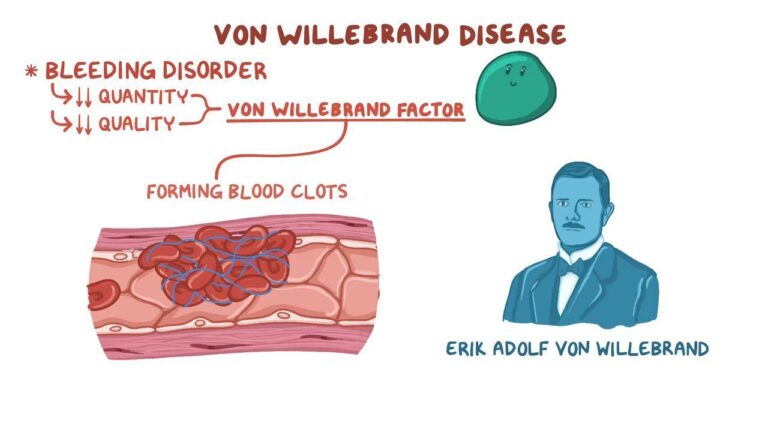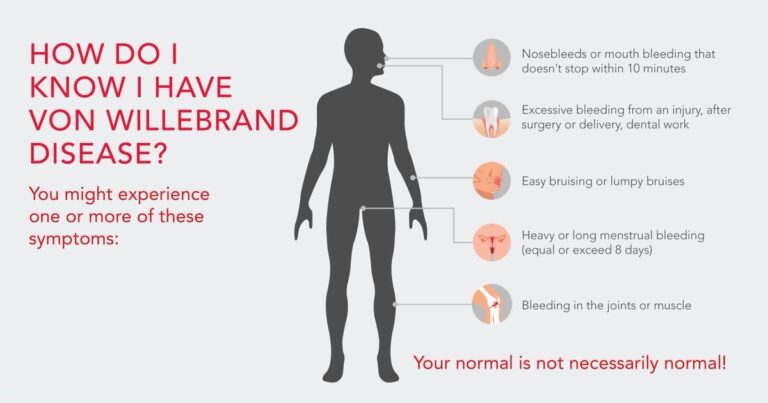WHAT IS VON WILLEBRAND DISEASE?
Von Willebrand disease is a lifetime bleeding disorder in which your blood does not clot well. People with the condition have low levels of von Willebrand factor, a protein that helps blood clot, or the protein does not work as it should.
The majority of people with the disease are born to it, having inherited it from one or both parents. Although, warning signs, like heavy bleeding after a dental procedure, may not show up for years.
Von Willebrand disease cannot be cured. But with treatment and self-care, the majority of people with this disease could lead active lives.
VON WILLEBRAND DISEASE SYMPTOMS
The majority of people with von Willebrand disease do not know it because the signs are mild or absent. The most common sign of the condition is unusual bleeding.
There are three major types of the disease. The amount of bleeding differs from one person to another, depending upon the type and severity of the disease.
If you have von Willebrand disease, you may have:
- Extreme bleeding from an injury or after surgery or dental work
- Nosebleeds that do not stop within ten minutes
- Heavy or long menstrual bleeding
- Blood in your urine or stool
- Easy bruising or lumpy bruises

Menstrual signs and symptoms might include:
- Blood clots greater than one inch (2.5 centimeters) in diameter in your menstrual flow
- The requirement to change your menstrual pad or tampon more than once an hour
- The requirement to use double sanitary protection for menstrual flow
- Signs and symptoms of anemia, including tiredness, fatigue, or shortness of breath
WHEN SHOULD YOU SEE A DOCTOR?
Contact your doctor or primary care physician if you have bleeding that lasts a long time or is difficult to stop.
VON WILLEBRAND DISEASE CAUSES
The common cause of von Willebrand disease is an inherited unusual gene that controls von Willebrand factor a protein that plays a crucial role in blood clotting.
When you have low levels of this protein or it does not perform as it should, small blood cells known as platelets cannot stick together appropriately nor attach themselves generally to the blood vessel walls when damage has happened. This interferes with the clotting process and could sometimes cause uncontrolled bleeding.
The majority of people with von Willebrand disease also have low levels of factor VIII, another protein that helps in clotting.
Factor VIII is involved in another inherited clotting disorder known as hemophilia. But unlike hemophilia, which primarily affects men, von Willebrand disease affects men and women and is generally milder.
Sometimes, von Willebrand disease could develop later in life in people who did not inherit an unusual gene from a parent. This is referred to as acquired von Willebrand syndrome, and it is probably caused by a hidden medical disease.
VON WILLEBRAND DISEASE RISK FACTORS
The primary risk factor for von Willebrand disease is having a family history of it. Parents pass the unusual gene for the disease to their children. Sometimes, the disease skips generations.
The disease is generally an “autosomal dominant inherited” disorder, which means you require an unusual gene from only one parent to be affected. If you have the gene for von Willebrand disease, you have a fifty percent chance of transmitting this gene to your children.
The most severe type of the disease is “autosomal recessive,” which means both of your parents have to pass an unusual gene to you.
VON WILLEBRAND DISEASE COMPLICATIONS
Sometimes, von Willebrand disease could cause uncontrollable bleeding, which could be life-threatening. Other complications of von Willebrand disease could include:
- Anemia – Women who have heavy menstrual bleeding could develop iron deficiency anemia.
- Swelling and pain – This could be a result of unusual bleeding in the joints or soft tissue.
VON WILLEBRAND DISEASE PREVENTION
Von Willebrand disease is generally a genetic disorder, consider having genetic counseling if you have a family history of this condition and you are planning to have children. If you carry the defective gene for von Willebrand disease, you could pass it on to your offspring, even if you do not have symptoms.
VON WILLEBRAND DISEASE DIAGNOSIS
Mild types of von Willebrand disease could be hard to diagnose because bleeding is frequent, and, for the majority of people, does not indicate disease. Although, if your doctor or primary care physician suspects you have a bleeding disorder, he or she may refer you to a blood disorders specialist (hematologist).
To assess you for von Willebrand disease, your doctor or primary care physician will probably ask you particular questions about your medical history and check for bruises or other signs of recent bleeding.
Your doctor or primary care physician will also likely recommend the following blood tests:
- Von Willebrand factor antigen – This determines the level of von Willebrand factor in your blood by measuring a specific protein.
- Von Willebrand factor activity – There are various tests to measure how well the von Willebrand factor performs in your clotting or coagulation process.
- Factor VIII clotting activity – This indicates whether you have unusually low levels and activity of factor VIII.
- Von Willebrand factor multimers – This assesses the structure of the von Willebrand factor into your bloodstream, its protein complexes, and the way its molecules break down. This information helps detect the type of von Willebrand disease you have.
The results of these tests could fluctuate in the same person over time due to factors like stress, exercise, infection, pregnancy, and medications. So you may need to repeat a few tests.
If you have von Willebrand disease, your doctor or primary care physician may recommend that family members undergo tests to determine if this disease runs in your family.
 VON WILLEBRAND DISEASE TREATMENT
VON WILLEBRAND DISEASE TREATMENT
Although von Willebrand disease has no cure, treatment could help prevent or stop bleeding incidents. Your treatment depends upon:
- The type and severity of your condition
- How you have responded to previous therapy
- Your other medications and conditions
Your doctor or primary care physician may recommend one or more of the following treatments to raise your von Willebrand factor, strengthen blood clots, or, in females, control heavy menstrual bleeding:
- Desmopressin – This drug is acquirable as an injection (DDAVP) or nasal spray (Minirin) it is a synthetic hormone that controls bleeding by stimulating your body to release more of the von Willebrand factor stored within the wall of your blood vessels.
- Many doctors or primary care physicians consider (DDAVP) the first treatment for managing von Willebrand’s disease. Some females use the nasal spray at the starting of their menstrual periods to control extreme bleeding. It could also be effective when used before a minor surgical procedure.
- Replacement therapies – These include infusions of concentrated blood-clotting or coagulating factors containing von Willebrand factor and factor VIII. Your doctor or primary care physician may recommend them if (DDAVP) is not an option for you or was ineffective.
- Another replacement therapy or treatment approved by the Food and Drug Administration (FDA) for treating adults 18 years and older is a genetically engineered (recombinant) von Willebrand factor product. Because recombinant factor is made without plasma, it could lower the risk of a viral infection or allergic reaction.
- Oral contraceptives – For women, these could be useful for controlling heavy bleeding during menstrual periods. The estrogen hormones in birth control pills could boost von Willebrand factor and factor VIII activity. This effect is probably available with birth control patches, though the additional study is required to confirm it.
- Clot-stabilizing medications – These anti-fibrinolytic drugs like aminocaproic acid (Amicar) and tranexamic acid (Cyklokapron, Lysteda) could help stop bleeding by slowing the breakdown of blood clots. Doctors or primary care physicians usually prescribe these drugs before or after a surgical procedure or tooth extraction.
- Drugs applied to cuts – A fibrin sealant (Tisseel VHSD) placed on a cut helps reduce or stop bleeding. This is applied like glue using a needle. There are also over-the-counter (OTC) products to stop nosebleeds.
If your disease is mild, your doctor or primary care physician may recommend treatment only when you are undergoing surgery or dental work or when you have had a trauma, like a car accident.
If you or anyone you know is suffering from von Willebrand disease, our expert providers at Specialty Care Clinics will take care of your health and help you recover.
Call (469) 545-9983 to book a telehealth appointment for an at-home check-up.

